|
|
|
Sort Order |
|
|
|
Items / Page
|
|
|
|
|
|
|
| Srl | Item |
| 1 |
ID:
150972
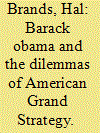

|
|
|
|
|
| Summary/Abstract |
Did the Obama administration have a grand strategy? If so, was it effective? Before Obama's presidency even ended, these questions were unleashing fusillades of contradictory commentary. Sympathetic observers credited Obama with a wise, well-integrated grand strategy that enhanced American power for “the long-game.”
|
|
|
|
|
|
|
|
|
|
|
|
|
|
|
|
| 2 |
ID:
137376
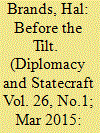

|
|
|
|
|
| Summary/Abstract |
Scholars have detailed the American “tilt” toward Iraq during the 1980s. There is, however, an important pre-history to this relationship, which has only emerged with the release of new American and Iraqi documents. American overtures to Saddam Hussein originated not under Reagan, but under his predecessor. From early in his presidency, Jimmy Carter sought to engage Iraq in hopes of moderating the Baathist regime and fortifying America’s position in the Persian Gulf and broader Middle East. Though this diplomacy ultimately proved unsuccessful, this episode has implications for the study of Carter’s foreign policy and the evolution of American–Iraqi relations.
|
|
|
|
|
|
|
|
|
|
|
|
|
|
|
|
| 3 |
ID:
158010
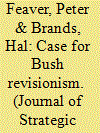

|
|
|
|
|
| Summary/Abstract |
This article reassesses the foreign policy legacy of George W. Bush in light of the emerging historical record of his administration. We conclude that, whereas Bush’s foreign policy was in widespread disrepute when he left office in 2009, that reputation is likely to improve – perhaps significantly – in the coming years. We identify six particular arguments that lend credence to an emerging ‘Bush revisionism.’ To be clear, we do not necessarily argue that the balance sheet on Bush’s foreign policy was positive, but the arguments presented here are likely to generate a more sympathetic and favorable historical assessment of Bush’s presidency over time.
|
|
|
|
|
|
|
|
|
|
|
|
|
|
|
|
| 4 |
ID:
161759
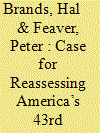

|
|
|
|
|
| Summary/Abstract |
Contemporary judgments of George W. Bush’s foreign policy were often quite harsh and polemical. In this article, we argue that a moderate form of Bush revisionism is likely to emerge in the coming years, as scholars take a more dispassionate look at his achievements in global affairs and the difficult circumstances under which his administration labored. We offer the six most persuasive arguments in favor of Bush revisionism; we then discuss the most reasonable critiques of these arguments. The overall thrust of this essay is not that Bush will someday be seen as one of America’s most successful statesmen, but simply that his reputation should improve as partisan passions fade and new evidence is considered.
|
|
|
|
|
|
|
|
|
|
|
|
|
|
|
|
| 5 |
ID:
113056


|
|
|
|
|
| Publication |
2012.
|
| Summary/Abstract |
This article uses captured Iraqi regime records to trace Saddam Hussein's strategic view of the United States from the time of his political ascendancy in the 1970s to his invasion of Kuwait in 1990. What is remarkable about Saddam's view of the United States is how consistently and virulently hostile it was. From early on, Saddam believed that the United States was unalterably opposed to his Baathist project and that Washington was seeking to marginalize and weaken Iraq. These sentiments were rooted in Baathist ideology and the key personality traits that shaped Saddam's worldview, but they were repeatedly reinforced by Washington's policies in the Middle East. Tacit U.S. support for Baghdad during the Iran-Iraq war aided Saddam's war effort but did little to ameliorate his fears. By the late 1980s and 1990, Saddam worried that American operatives were trying to assassinate him, and he saw the United States (and its ally, Israel) as the foreign powers most dangerous to his regime. This view of U.S. policy, in turn, seems to have had an important influence on Saddam's decision to invade Kuwait.
|
|
|
|
|
|
|
|
|
|
|
|
|
|
|
|
| 6 |
ID:
106609
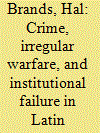

|
|
|
|
|
| Publication |
2011.
|
| Summary/Abstract |
This article examines the current crisis in Guatemala as a case study in the phenomenon of "criminal insurgency" in Latin America. Since the close of Guatemala's civil war in 1996, crime-especially violent crime-has increased dramatically, to the point that drug traffickers, organized crime syndicates, and youth gangs are effectively waging a form of irregular warfare against the state. The police, the judiciary, and entire local and departmental governments are rife with criminal infiltrators; murder statistics have surpassed civil-war levels in recent years; criminal operatives assassinate government officials and troublesome members of the political class; and chunks of territory are now effectively under the control of criminal groups. All this has led to growing civic disillusion and eroded the authority and legitimacy of the government. Rampant crime is causing a crisis of the democratic state.
|
|
|
|
|
|
|
|
|
|
|
|
|
|
|
|
| 7 |
ID:
103920
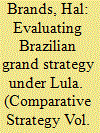

|
|
|
|
|
| Publication |
2011.
|
| Summary/Abstract |
This article analyzes Brazilian grand strategy under President Luiz Inacio Lula da Silva. During Lula's eight years in office, he pursued a multitiered grand strategy aimed at hastening the transition from U.S. and Western hegemony to a multipolar order more favorable to Brazilian interests. Lula did so by emphasizing three diplomatic strategies: soft balancing, coalition building, and seeking to position Brazil as the leader of a more united South America. During Lula's time in office, this strategy successfully raised Brazil's profile and increased its diplomatic flexibility, but the country still faces several potent strategic dilemmas that could complicate or undermine its geopolitical ascent.
|
|
|
|
|
|
|
|
|
|
|
|
|
|
|
|
| 8 |
ID:
159121
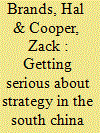

|
|
|
|
|
| Summary/Abstract |
As Chinese advances in the South China Sea accumulate and the situation reaches a critical stage,
the United States has four basic options for filling the strategy vacuum.
|
|
|
|
|
|
|
|
|
|
|
|
|
|
|
|
| 9 |
ID:
177879
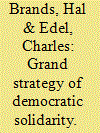

|
|
|
|
|
| Summary/Abstract |
On March 12, 1947, Harry Truman addressed a joint session of Congress with a very specific proposal: emergency aid for Greece and Turkey, which were menaced by a communist insurgency and facing Soviet intimidation, respectively. But Truman, speaking at the dawn of the Cold War, framed the matter far more expansively. Allowing the countries of the world to “work out a way of life free from coercion,” he explained, had been a “fundamental issue in the war with Germany and Japan.” At a time when “nearly every nation must choose between alternative ways of life,” the United States must once again “support free peoples who are resisting attempted subjugation by armed minorities by outside pressures.”
|
|
|
|
|
|
|
|
|
|
|
|
|
|
|
|
| 10 |
ID:
102367
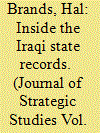

|
|
|
|
|
| Publication |
2011.
|
| Summary/Abstract |
This article uses captured Iraqi state records to examine Saddam Hussein's reaction to US arms to sales to Iran during the Iran-Iraq War (the Iran/Contra scandal). These records show that 'Irangate' marked a decisive departure in Saddam's relations with the United States. Irangate reinforced Saddam's preexisting suspicions of US policy, convincing him that Washington was a strategic enemy that could not be trusted. Saddam concealed his anger to preserve a working relationship with the Reagan administration, but this episode nevertheless cemented his negative views of the United States and forged a legacy of hostility and mistrust that would inform his strategic calculus for years to come.
|
|
|
|
|
|
|
|
|
|
|
|
|
|
|
|
| 11 |
ID:
181600
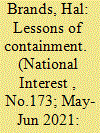

|
|
|
|
|
| Summary/Abstract |
Walter Lippmann was right that the Cold War would expose America to great evils. He was wrong to think that America could not, or should not, accept them as the price of avoiding even greater ones.
|
|
|
|
|
|
|
|
|
|
|
|
|
|
|
|
| 12 |
ID:
163386
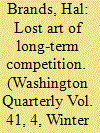

|
|
|
|
|
| Summary/Abstract |
Deeply versed in the challenges of long-term competition during the Cold War, the United States has had the luxury of neglecting this competency for more than a generation. Washington must reacquaint itself with 12 bedrock principles of long-term competition if it hopes to succeed in the geopolitical rivalries playing out today.
|
|
|
|
|
|
|
|
|
|
|
|
|
|
|
|
| 13 |
ID:
181594
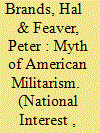

|
|
|
|
|
| Summary/Abstract |
The United States needs a serious debate about how, where, and whether to use force in an era when its resources are stretched. It requires a highly disciplined approach to employing its military power in an age of great-power rivalry. Yet the myth of American militarism is bad analysis that leads to lousy prescription.
|
|
|
|
|
|
|
|
|
|
|
|
|
|
|
|
| 14 |
ID:
182253
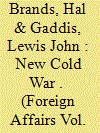

|
|
|
|
|
| Summary/Abstract |
Is the world entering a new cold
war? Our answer is yes and no. Yes
ifwe mean a protracted international rivalry, for cold wars in this sense
are as old as history itself. Some became
hot, some didn’t: no law guarantees
either outcome. No ifwe mean theCold
War, which we capitalize because it
originated and popularized the term.
That struggle took place at a particular
time (from 1945–47 to 1989–91), among
particular adversaries (the United
States, the Soviet Union, and their
respective allies), and over particular
issues (post–World War II power
balances, ideological clashes, arms
races). None ofthose issues looms as
large now, and where parallels do
exist—growing bipolarity, intensifying
polemics, sharpening distinctions
between autocracies and democracies—
the context is quite di+erent.
|
|
|
|
|
|
|
|
|
|
|
|
|
|
|
|
| 15 |
ID:
173662
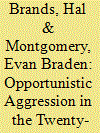

|
|
|
|
|
| Summary/Abstract |
Policymakers should not fool themselves into thinking that there are easy, lowcost alternatives to keeping the threat of opportunistic aggression at bay.
|
|
|
|
|
|
|
|
|
|
|
|
|
|
|
|
| 16 |
ID:
070316
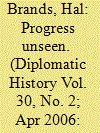

|
|
|
| 17 |
ID:
105998
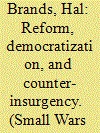

|
|
|
|
|
| Publication |
2011.
|
| Summary/Abstract |
Current debate on US counter-insurgency doctrine is dominated by the notion that promoting 'legitimacy' and 'good governance' constitutes a central strategic imperative. This idea is hardly new; during the Cold War US officials often sought to encourage democratization and socio-economic reform as antidotes to revolution in Latin America. This article reviews four such cases - Venezuela during the first half of the 1960s, Guatemala throughout the 1960s, Nicaragua during the late 1970s, and El Salvador during the 1980s. The purpose is to bring a historical perspective to bear on current debates about the feasibility of US counter-insurgency strategy by evaluating the effectiveness of previous campaigns to promote improved governance in developing societies wracked by guerrilla violence.
|
|
|
|
|
|
|
|
|
|
|
|
|
|
|
|
| 18 |
ID:
107069
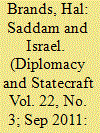

|
|
|
|
|
| Publication |
2011.
|
| Summary/Abstract |
This article uses newly available Iraqi records to examine Saddam Hussein's strategic view of Israel, from the time of his political ascendancy in the late 1970s to the Persian Gulf War of 1990-1991. It sheds light on a variety of issues: the sources and motives of Saddam's bitter hostility to Israel, his desire for a bloody war of attrition against the "Zionist entity," the role of Israel in motivating the Iraqi nuclear programme, Iraq-Israel relations during the Iran-Iraq War, Saddam's fears of an Israeli strike in the run-up to the invasion of Kuwait in 1990, and his motives for attacking Israel with SCUD missiles in 1991.
|
|
|
|
|
|
|
|
|
|
|
|
|
|
|
|
| 19 |
ID:
105980
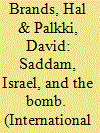

|
|
|
|
|
| Publication |
2011.
|
| Summary/Abstract |
Efforts to understand Saddam Hussein's strategic thought have long been hampered by the opacity and secrecy of the Baathist regime. Newly available, high-level Iraqi archival documentation demonstrates that in the late 1970s and early 1980s, Saddam viewed nuclear weapons through a fundamentally coercive, revisionist lens. He had long hoped to wage a grinding war of attrition against the Israeli state, and he believed that Iraqi acquisition of the bomb would neutralize Israeli nuclear threats, force the Jewish state to fight at the conventional level, and thereby allow Iraq and its Arab allies (with their larger economic and population base) to prosecute a prolonged war that would displace Israel from the territories occupied in 1967. These findings have implications for the existing theoretical literature on the causes and consequences of nuclear proliferation, as well as for the growing body of work on "nuclear alarmism." The Iraqi case undermines the thesis that states proliferate primarily because of defensive concerns. Saddam certainly viewed possession of the bomb as a means of enhancing Iraq's security, but his attraction to nuclear weapons revolved around offensive objectives. Saddam hoped to exploit the deterrent balance with Israel to initiate a bloody conventional war that would have likely been immensely destructive and destabilizing for the Middle East as a whole. In other words, though Saddam never obtained nuclear weapons, his views on their potential utility give good cause for both pessimism and alarm.
|
|
|
|
|
|
|
|
|
|
|
|
|
|
|
|
| 20 |
ID:
154092
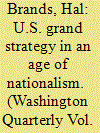

|
|
|
|
|
| Summary/Abstract |
America is an exceptional nation, but not when it comes to the wave of nationalism sweeping the globe. Across multiple continents, leaders and polities are pushing back against globalization and integration; they are reasserting national sovereignty as a bulwark against international tumult. In the United States, this nationalist resurgence has manifested in a sharp and potentially existential challenge to the internationalist project that has animated U.S. grand strategy since World War II.
|
|
|
|
|
|
|
|
|
|
|
|
|
|
|
|
|
|
|
|
|